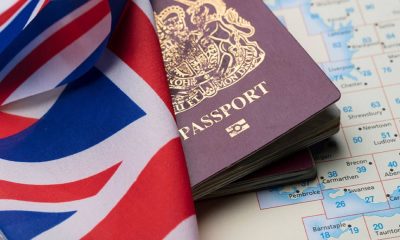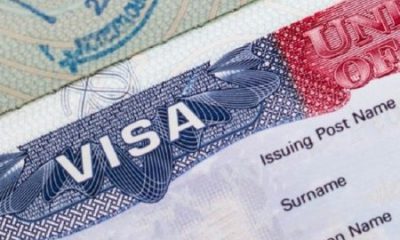Visa
US Visas: Marriage Visas, Its Types, Marriage-Based Green Cards & More

Foreign-born nationals can live and work in the United States in a variety of ways. Some prefer to exploit their employment or major investment, while others seek asylum through immediate family members. However, one advantageous approach to immigrate to the United States is through your fiance or marriage. We’ll go through the most common marriage visas and green cards, as well as how to apply for one. Managing marriage immigration might be difficult, but it doesn’t have to be.
What is the DOS Definition of a Spouse?
Before you can qualify for a marriage-based visa, you must be the spouse of a U.S. citizen or lawful permanent resident. According to the U.S. Department of State, “a spouse is a legally wedded wife or husband.” The following explanations further clarify what a spouse is and what it isn’t when it comes to the immigration application process:
- Merely living together doesn’t qualify a marriage for immigration.
- If you are a common-law spouse, you may qualify for a marriage visa depending on what the law says in the country where the common-law marriage took place. Common-law marriage is an agreement between a man and woman to get married without observing a religious or civil ceremony.
- If you are in a polygamous marriage, only the first spouse may qualify as a spouse eligible for a marriage visa.
Types of Nonimmigrant Marriage Visas
The nonimmigrant visas that have to do with marriage are found in the K category. These visas serve as temporary placeholders as you wait for your green card. The four categories in the K classification include:
- K-1 fiancé(e) visa – this visa is designed only for the fiancé(e)s of U.S. citizens. According to immigration law, someone counts as a fiancé(e) only if the U.S. citizen intends to marry the foreign national within 90 days of his or her entry into the U.S.
- K-2 visa – this one is for the children of a foreign national fiancé(e) who is under K-1 status. They will be under this nonimmigrant status only until their statuses are adjusted, and they can receive green cards.
- K-3 visa – this visa is meant for the foreign-born spouses of U.S. citizens. If the citizen sponsor has filed an I-130 for a marriage-based green card, the alien spouse can use the K-3 visa to remain in the U.S. while awaiting the decision.
- K-4 visa – If your K-3 spouse has children coming with him or her, they can stay in the U.S. under K-4 status. The only caveat is that, if the child is the step-child of the U.S. citizen sponsor, then the marriage will have to have taken place before the child turned 18 in order for him or her to qualify for K-4 status.
Fortunately, foreign immigrants with K status can apply for employment authorization documents (EAD). Keep in mind that failing to meet the 90-day deadline for the wedding date will result in a violation of your K-1 or K-2 status. Similarly, if you divorce or have your marriage annulled, your K-3 and K-4 statuses will be null and void. In some situations, the foreign fiance, spouse, or children must leave the United States or be labeled “out of status.”
Marriage Visa Application Process
Foreigners can apply for EADs while in K status, thankfully. Missing the 90-day wedding date deadline will breach you.The U.S. citizen sponsor must file an I-129F petition for their foreign fiancé for K-1 and K-2 visas. A fiancé(e) cannot petition for themselves. If the petition is authorized, the fiancé(e) must visit the U.S. Consulate or Embassy in their native country. The consulate officer will interview them one-on-one to verify your relationship.
If you pass the interview, the fiancé(e) will receive a K-1 visa and any K-2 visas for accompanying children. The U.S. citizen sponsor can immediately file an I-130 for a marriage-based green card after marrying the foreign fiancé(e).
The I-129F petition can only be filed after the immigrant spouse files the I-130 for K-3 and K-4 visas. No separate petition is needed for K-4 dependents, the K-1 or K-2 classification. Divorce or annulment nullifies K-3 and K-4 statuses. These circumstances require the foreign fiance, husband, or children to leave the U.S. or be labeled “out of status”.
Marriage-Based Green Cards
Foreign-born spouses need a marriage-based green card to reside and work in the U.S. The above nonimmigrant visas are temporary while you wait for the green card. The U.S. citizen sponsor must file an I-130 petition with USCIS and wait for approval. Despite the extended wait, your fiancé(e) or spouse can stay in the U.S. on a K-1 or K-3 visa. He or she can also work using an EAD card. Consult your immigration attorney to ease the move.
How to Get a Marriage-Based Green Card
While a marriage-based green card is one of the most common ways to become a U.S. permanent resident, it still requires a complicated process that has several stages involving both the petitioner and the beneficiary. They are as follows:
Form I-130 Petition
Form I-130, Petition for Alien Relative, is the initial step to a marriage-based green card. The beneficiary spouse must file the form with USCIS on behalf of a U.S. citizen or permanent resident.
This form requests Agency approval for your spouse to dwell in the U.S. permanently. It also lets you prove your marriage, which is the basis of any marriage-based petition.
USCIS requires different documents to verify a husband-wife relationship, including a marriage certificate from the nation where the marriage took place. Joint bank accounts, family photos, and other proof will further support your argument.
Marriage immigration requires many papers and paperwork depending on your history.
Form I-130 Document Checklist
The I-130 petition must be submitted with the following
- Passport-style color photograph of the petitioner and of the beneficiary taken within 30 days of filing the petition
- Petitioner’s proof of citizenship such as a valid U.S. passport, naturalization certificate, or birth certificate
- Marriage certificate issued by a recognized authority
- Evidence of a bona fide marriage relationship such as a shared residence and finances. Examples for this include joint bank accounts, apartment leases, shared household bills, health or life insurance designations, birth certificates of children born to the marriage, etc.
- In case any or both of you had previously been in a marriage, there must be evidence of legal termination of the previous marriage(s). This will require an annulment or divorce certificate or death certificate.
NVC Processing
After your I-130 petition is approved, USCIS will transfer the case file to the National Visa Center (NVC) for processing. The NVC will issue you a case number and provide you with instructions for completing Form DS-261, the Choice of Address and Agent form. You will also be informed of the applicable application fees. Following payment, the NVC will request that you provide the relevant immigrant visa supporting documents, such as an affidavit of support, civil documents, and application forms.
Required Documents for NVC Processing
Generally, you will need to submit the following items for your NVC processing:
- Passport(s) valid for at least six months before your intended date of entry into the U.S.
- Affidavit of Support completed by the petitioning spouse based in the U.S.
- Form DS-260, Immigrant Visa and Alien Registration Application
- Two 2 x 2 photographs, according to these photo requirements
- Completed medical examination forms
- Civil documents: This includes birth certificates, adoption documentation, marriage certificates, court and prison records, marriage termination documentation, military records, and police certifications. More country-specific documents may be requested depending on the embassy or consulate in charge of your case.
Visa Interview
After receiving the required documents, the NVC will schedule an interview. The U.S. embassy or consulate where you will be interviewed will get a file with your petition and papers. You will then receive the visa interview date, time, and medical exam instructions.
You must be at the embassy 15–30 minutes early for the interview. You must bring your passport and other documentation. Before interviewing with a consular officer, you will have an ink-free digital fingerprint scan. The interview will determine your approval or denial.
Entering the United States
If you are given a visa following the interview, you will be able for using it to enter the United States through a port of entry. Remember that a visa is merely a legal travel document and does not guarantee entry into the United States. Customs and Border Protection (CBP) officials in the United States have the authority to either approve or prohibit access to the country. If your admission request is approved, you will be admitted as a permanent resident.
Getting Your Green Card
Once you have been admitted, your green card will be mailed to you within 120 days of entering the U.S. If after 120 days, you haven’t received your permanent green card, you can contact USCIS via this link.
Green Card Process for a Spouse Living in the United States
If your spouse has a legitimate nonimmigrant status in the US, USCIS can complete the process. The beneficiary must file Form I-485 with USCIS to adjustment of status after the I-130 petition is approved.
If a U.S. citizen sponsors the petition, the I-485 adjustment of status can be filed with the I-130. Marriage-based green cards are always accessible, so you don’t have to wait for your priority date to change. Filing for a marriage-based green card simultaneously can speed up processing. You can get your green card after the I-485 petition is approved, whether concurrent or separate.
Processing Fees for Marriage-Based Green Card
- Form I-130, Petition for Alien Relative: $535
- Department of State (DOS) Processing Fee: $325
- USCIS Immigrant Fee: $220
- Biometric Fee (if applicable): $85
- Affidavit of Support Fee: $120
- Adjustment of Status (Form I-485) Fee: $1,140
- Immigration medical examination fee (costs vary among authorized physicians)






















